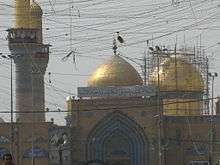July 2010 Baghdad attacks
The July 2010 Baghdad attacks were a series of bombings that involved a suicide bomber and other bomb attacks in Baghdad, Iraq, which killed at least 70 people while injuring 400[1][2] during a Shia pilgrimage to the mausoleum of Musa al-Kadhim.[3] The bombings targeted those on the annual pilgrimage and took place from the 6 to 8 July. The pilgrimage has been attacked in previous years by Sunni extremists and in 2005 was the site of a stampede that killed up to 1,000 people.
| July 2010 Baghdad attacks | |
|---|---|
 Mausoleum of Musa Kadhim | |
| Location | Baghdad, Iraq |
| Date | 6-8 July 2010 19:45 – (UTC+4) |
| Target | Shia pilgrims |
Attack type | Suicide bomb + other bombings |
| Deaths | 70+[1] |
| Injured | 400+[2] |
Background
The pilgrimage to the mausoleum of Musa Kadhim is of significance because he was the seventh of 12 revered imams in Shia Islam. The pilgrimage was due to reach its climax on the night of the bombing and into the early hours of the next day.
In 2005, 1,000 people were killed in a stampede on the way to this mausoleum during the same pilgrimage. In 2009, Shia pilgrims were killed on the way to the shrine (including many Iranians) in a suicide attack.[3][4]
The attacks also followed US Vice President Joe Biden's visit to meet senior Iraqi officials to urge them to form a government.[1]
Attacks
During the Shia pilgrimage festivities to the mosque that lasted three days from 6 – 8 July various attacks in the city took place. The most deadly attack occurred in the hours before tens of thousands of Shia's came into Baghdad amid heavy security for the pilgrimage. Hundreds of tents were erected to feed people as they came into town. Another bomb struck in the central Bab al-Muazam neighbourhood while a third exploded in the southeastern Mashtal district.[1]
The deadliest attack occurred in Adhamiyah district on 7 July, killing 28 people and leaving a further 136 wounded.[2] Eleven more people in the area were killed in bomb attacks on the same day.[2] Further attacks were carried out whilst the pilgrimage ended on 8 July that killed 11 and injured more than 77 more.[2] Some of the attacks were made with mortars and others with roadside bombs.[5]
Heavy security had been put in place prior to the attacks as bombings that target Shia pilgrims are common in Iraq. Military checkpoints were in place and all vehicular traffic had been banned on several of Baghdad's main bridges.[2] Major General Qassim Atta of the Baghdad police said special safety measures, including road closures, were employed to protect the pilgrims. "We continue to organise transport for pilgrims and air surveillance for their benefit. The movement of motorcycles, bicycles and carts is banned throughout the city until further notice." However, a lone suicide bomber struck the crowd en route to the shrine.[3]
Responsibility
Though no one claimed responsibility, a correspondent for the Christian Science Monitor said that in the past "these very large Shia pilgrimages have been targeted by Sunni militants interested in increasing sectarian tension[s]."[3] The attacks were seen as a "clear indication of the determination of anti-government fighters to exploit Iraq's political vacuum and destabilise the country as US troops prepare to leave."[1]
Reaction
![]()
See also
References
- "Deadly attacks target Iraq pilgrims". english.aljazeera.net. Retrieved 23 April 2018.
- Abboud, Assad (8 July 2010). "Baghdad attacks on Shiite pilgrims kill 70 in three days". Montreal Gazette. Retrieved 8 July 2010.
- "Pilgrims die in Iraq suicide attack". Al Jazeera. Al Jazeera. 7 July 2010. Retrieved 7 July 2010.
- "Fresh Iraq bombings hit Shia pilgrims in Baghdad". BBC News. 8 July 2010. Retrieved 8 July 2010.
- "Nearly 70 dead in 3 days of Baghdad violence". Australia Network News. 8 July 2010. Archived from the original on 7 July 2011. Retrieved 8 July 2010.
- http://www.almanar.com.lb/newssite/NewsDetails.aspx?id=145648&language=en